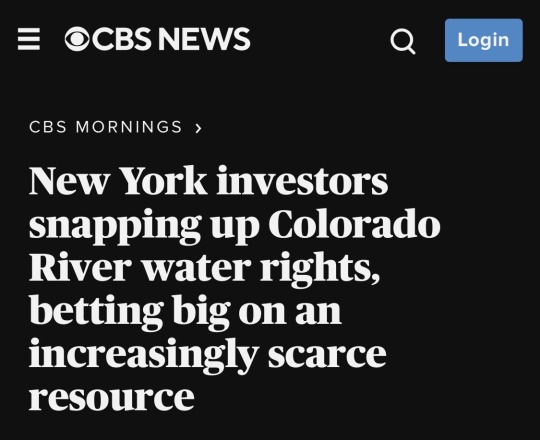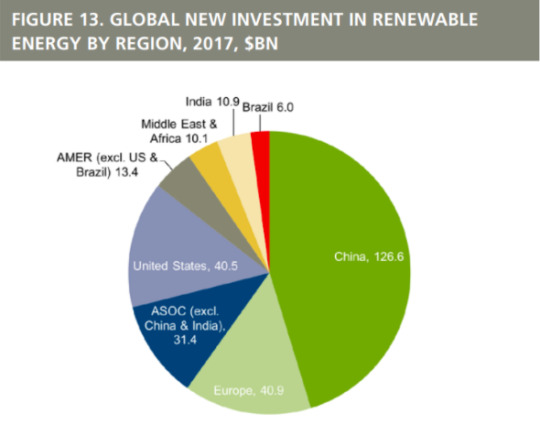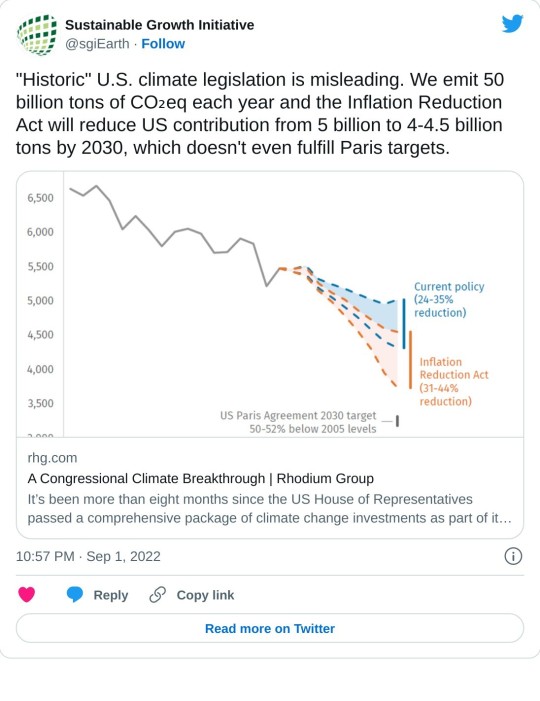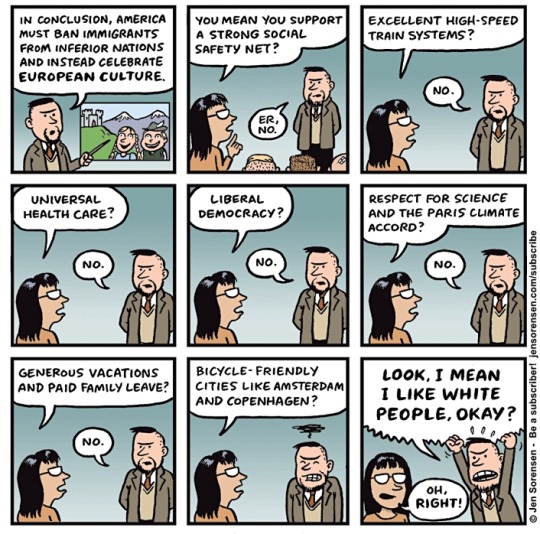#climate policy
Text
No paywall version here.
"Two and a half years ago, when I was asked to help write the most authoritative report on climate change in the United States, I hesitated...
In the end, I said yes, but reluctantly. Frankly, I was sick of admonishing people about how bad things could get. Scientists have raised the alarm over and over again, and still the temperature rises. Extreme events like heat waves, floods and droughts are becoming more severe and frequent, exactly as we predicted they would. We were proved right. It didn’t seem to matter.
Our report, which was released on Tuesday, contains more dire warnings. There are plenty of new reasons for despair. Thanks to recent scientific advances, we can now link climate change to specific extreme weather disasters, and we have a better understanding of how the feedback loops in the climate system can make warming even worse. We can also now more confidently forecast catastrophic outcomes if global emissions continue on their current trajectory.
But to me, the most surprising new finding in the Fifth National Climate Assessment is this: There has been genuine progress, too.
I’m used to mind-boggling numbers, and there are many of them in this report. Human beings have put about 1.6 trillion tons of carbon in the atmosphere since the Industrial Revolution — more than the weight of every living thing on Earth combined. But as we wrote the report, I learned other, even more mind-boggling numbers. In the last decade, the cost of wind energy has declined by 70 percent and solar has declined 90 percent. Renewables now make up 80 percent of new electricity generation capacity. Our country’s greenhouse gas emissions are falling, even as our G.D.P. and population grow.
In the report, we were tasked with projecting future climate change. We showed what the United States would look like if the world warms by 2 degrees Celsius. It wasn’t a pretty picture: more heat waves, more uncomfortably hot nights, more downpours, more droughts. If greenhouse emissions continue to rise, we could reach that point in the next couple of decades. If they fall a little, maybe we can stave it off until the middle of the century. But our findings also offered a glimmer of hope: If emissions fall dramatically, as the report suggested they could, we may never reach 2 degrees Celsius at all.
For the first time in my career, I felt something strange: optimism.
And that simple realization was enough to convince me that releasing yet another climate report was worthwhile.
Something has changed in the United States, and not just the climate. State, local and tribal governments all around the country have begun to take action. Some politicians now actually campaign on climate change, instead of ignoring or lying about it. Congress passed federal climate legislation — something I’d long regarded as impossible — in 2022 as we turned in the first draft.
[Note: She's talking about the Inflation Reduction Act and the Infrastructure Act, which despite the names were the two biggest climate packages passed in US history. And their passage in mid 2022 was a big turning point: that's when, for the first time in decades, a lot of scientists started looking at the numbers - esp the ones that would come from the IRA's funding - and said "Wait, holy shit, we have an actual chance."]
And while the report stresses the urgency of limiting warming to prevent terrible risks, it has a new message, too: We can do this. We now know how to make the dramatic emissions cuts we’d need to limit warming, and it’s very possible to do this in a way that’s sustainable, healthy and fair.
The conversation has moved on, and the role of scientists has changed. We’re not just warning of danger anymore. We’re showing the way to safety.
I was wrong about those previous reports: They did matter, after all. While climate scientists were warning the world of disaster, a small army of scientists, engineers, policymakers and others were getting to work. These first responders have helped move us toward our climate goals. Our warnings did their job.
To limit global warming, we need many more people to get on board... We need to reach those who haven’t yet been moved by our warnings. I’m not talking about the fossil fuel industry here; nor do I particularly care about winning over the small but noisy group of committed climate deniers. But I believe we can reach the many people whose eyes glaze over when they hear yet another dire warning or see another report like the one we just published.
The reason is that now, we have a better story to tell. The evidence is clear: Responding to climate change will not only create a better world for our children and grandchildren, but it will also make the world better for us right now.
Eliminating the sources of greenhouse gas emissions will make our air and water cleaner, our economy stronger and our quality of life better. It could save hundreds of thousands or even millions of lives across the country through air quality benefits alone. Using land more wisely can both limit climate change and protect biodiversity. Climate change most strongly affects communities that get a raw deal in our society: people with low incomes, people of color, children and the elderly. And climate action can be an opportunity to redress legacies of racism, neglect and injustice.
I could still tell you scary stories about a future ravaged by climate change, and they’d be true, at least on the trajectory we’re currently on. But it’s also true that we have a once-in-human-history chance not only to prevent the worst effects but also to make the world better right now. It would be a shame to squander this opportunity. So I don’t just want to talk about the problems anymore. I want to talk about the solutions. Consider this your last warning from me."
-via New York Times. Opinion essay by leading climate scientist Kate Marvel. November 18, 2023.
#WE CAN DO THIS#I SO TRULY BELIEVE THAT WE CAN DO THIS#WE CAN SAVE OURSELVES AND THE WORLD ALONG WITH US#climate crisis#united states#climate change#conservation#hope posting#sustainability#climate news#climate action#climate emergency#fossil fuels#global warming#environmentalism#climate hope#solarpunk#climate optimism#climate policy#earth#science#climate science#meteorology#extreme weather#renewable energy#solar power#wind power#renewables#carbon emissions#climate justice
33K notes
·
View notes
Text
If we lived in a decent society we’d behead people like this

Absolute ghouls. People who see the looming water shortage as a profitable opportunity aren’t worth the air they breathe.
#at what point to wh break out the guillotine#i’m so serious#capitalism#late stage capitalism#anti capitalist#capitalist system#hunt the rich for sport#hunt capitalists for sport#eat the rich#water scarcity#water shortage#climate change#climate crisis#climate and environment#climate disaster#climate action#jail climate criminals#climate solutions#climate policy#climate science#climate news#climate catastrophe#climate activism#climate emergency#climate chaos
169 notes
·
View notes
Text
« [T]here’s a existential threat: It is climate. We have a crazy SOB like that guy Putin and others, and we always have to worry about nuclear conflict. But the existential threat to humanity is climate. »
— President Joe Biden at a campaign event in San Francisco on Wednesday. From the White House Press Office.
Compare Biden's comments on climate with Trump's intention to go hog-wild with fossil fuel when he becomes a dictator...
"I want to drill, drill, drill.”
A second Trump term would be "horrific" for the planet.
‘In a word, horrific’: Trump’s extreme anti-environment blueprint
Also, that "crazy SOB" Vladimir Putin is doing significant damage to the environment with his war of aggression against Ukraine that started two years ago Saturday.
Ukraine: How the war is poisoning the environment
Russia must pay for the environmental catastrophe it's causing in Ukraine.
In addition to severe environmental damage caused by the war, Putin's Russia is also one of the world's top fossil fuel producers. Putin and a second Trump term could push this planet over the edge.
BREAKING NEWS: Several hundred new sanctions against Russia were just announced by the White House.
US targets Russia with more than 500 new sanctions
#climate change#existential threat to humanity#climate policy#the environment#joe biden#election 2024#a second trump term#donald trump#extreme anti-environmentalism#republicans#fossil fuels#vladimir putin#putin is a crazy sob#владимир путин#путин хуйло#путина в гаагу!#путин - сумасшедший сукин сын#путин разрушает окружающую среду#военные преступления#экологическая катастрофа#руки прочь от украины!#геть з україни#екоцид#слава україні!#героям слава!#new sanctions against russia
21 notes
·
View notes
Text
With electric vehicle sales in Canada breaking records every year, the demand is clear, say advocates of EVs.
"There is currently very high interest, and that interest is growing," said Louise Lévesque, director of policy at Electric Mobility Canada, a national industry association that works to advance electric transportation.
Environment Minister Steven Guilbeault last week unveiled the federal government's electric vehicle sales mandate regulations, which include a national target of 100 per cent zero-emission vehicle sales by 2035. In making his announcement, Guilbeault also noted how the Canadian marketplace is already experiencing "a rapid shift toward zero-emission vehicles."
But some observers say the market and demand for EVs is more nuanced, that data shows most Canadians still aren't particularly eager to buy one and that the targets laid out by Guilbeault might be difficult to achieve.
"If we have to get to 100 per cent of new car sales by 2035, the path we're on right now won't get us there," said Niel Hiscox, president of Clarify Group Inc., a Canadian-based automotive research and advisory firm. [...]
Continue Reading.
Tagging: @politicsofcanada
30 notes
·
View notes
Text
109 notes
·
View notes
Text
#good news#washington state#climate policy#environmentalism#science#environment#nature#climate law#climate change#usa#climate crisis
7 notes
·
View notes
Text
Another difference between tumblr and reddit is definitely doomerism culture.
On Tumblr, accounts will pop up in the notes to say shit like "the world is going to end anyways", "we can't do anything", yadda yadda. There's a constant stream of apocalyptic rhetoric across the entire site, as tumblr doomers try to sap as many conversations as possible.
Meanwhile on reddit, you wouldn't get that sort of proselytism. Maybe it's because of the forum-esque system that reddit uses, maybe it's because you can actually argue in a way that matters, but reddit doomers mostly retreat to their own subreddits.
For my non-reddit followers, you've never heard of r/collapse. Don't! It's one of the worst places on the internet. It's a cultural meld of Q-Anon cultists with a for-profit suicide forum, all coated in a wet coat of "leftism" or "climate realism". It's a subreddit whose main export is SH-adjacent "I'm better than you for feeling worse" rhetoric. Facts and progress don't matter, because at the end of it all, the world ends.
It has 500,000 members. It's not a small subreddit by any metric. And they all stay there.
If you've reblogged a post on Tumblr with the caption "climate change will get us regardless", you need to understand that you are in a pipeline that leads to communities like this. The only motivation is to hit the bottom first, and your nihilism is exploitable for attention.
Progress has been made and will continue to be made. Remember, problems like CFCs and acid rain have been effectively solved--not by capitalism, but by effective targeted regulation. That ocean temperature graph you're all obsessed with right now? That's a direct result of new UN policy banning many harmful emissions from cruise ships, which has let more sunlight hit the ocean.
Tumblr doomers are wrong. I want you to fully understand that you are wrong. And if you want to keep being wrong, I want you to understand the sort of community that will accept you.
#eggshell writes#textpost#reddit culture#climate change#climate policy#doomer#climate doom#collapse#this isn't even the most notorious reddit cult incidentally#that honour goes to r/superstonk#i can do a writeup on it if dan olsen doesn't get his video out first
29 notes
·
View notes
Text
"An Oxfam analysis with the Stockholm Environment Institute found the following:
The per capita [carbon] emissions of someone in the top 1 percent is 100 times higher than someone in the bottom 50 percent, and 35 times higher than the target for 2030.
Since 1990, the richest 5 percent was responsible for over a third of the growth in total emissions. The top 1 percent was responsible for more than the whole of the bottom 50 percent.
For about 20 percent of the human population — corresponding to the working and lower-middle classes in rich countries, mainly — per capita emissions actually fell from 1990 to 2015...
Looking at the emissions of different income groups and the nature of those emissions has the potential to transform climate policymaking. To maintain any level of fairness, the richest must make by far the biggest cuts to their emissions. This is true in both rich and developing countries.
This means, for example, that we should have not a flat carbon tax but a progressive carbon tax: the more carbon you use, the higher the tax you pay. Polluting investments should have additional punitive taxation put on them or, better still, simply be banned. Luxury goods and private jets should be heavily taxed or heavily restricted. Each national action to tackle climate should be taken progressively, in ways that make the richest, highest emitters shoulder most of the cost, and in turn contribute to increasing equality, not inequality.
General increases in taxes on the richest and on wealth, as well as other moves to rapidly reduce inequality, also take on a whole new climate imperative. Our planet simply cannot afford the very rich."
- Max Lawson, from "The Rich Are the Ones Burning the Planet." Jacobin, 10 October 2022.
#max lawson#quote#quotations#eat the rich#oxfam#stockholm environment institute#climate policy#carbon tax#carbon emissions#economics#climate change#climate crisis#inequality#fossil fuels#environmentalism#capitalism
57 notes
·
View notes
Text
Berlin’s plan for a car-free city prompts bitter war of words | Germany | The Guardian

#berlin#kreuzberg#gräfekiez#ban on autos#car-free#pollution#enviroment#climate policy#bicycles#fahrräder#pkw
5 notes
·
View notes
Text
The US should treat climate policy as economic policy
Climate policy is economic policy. The US has so many strategic advantages. A diverse energy portfolio creates jobs, shores up the industrial base and manufacturing. It doesn't matter what china/India do. China is making the transition surpassing the US in renewables. This is an economic/ innovative vector. I was just in India and solar is making inroads along with a multitude of other domains. That's 1.4 billion mouths to your 335 million. Not acknowledging that fact makes you look like a naive, stingy hoarding curmudgeon. Lead!!! Even in a multipolar world you create power vacuums. This transition is business savvy and a sound long term strategy to diversify US economic interests over the long haul. You get to make things again. Hopefully better than just about anyone else. Your failure over the last 20 years to include the average American has caused a lot of domestic strife. To the advantage of adversaries. Ignore it now at your own peril.

2 notes
·
View notes
Text

View on Twitter
"Historic" U.S. climate legislation is misleading. We emit 50 billion tons of CO₂eq each year and the Inflation Reduction Act will reduce US contribution from 5 billion to 4-4.5 billion tons by 2030, which doesn't even fulfill Paris targets.
(Source)
4 notes
·
View notes
Text
Politicians are lining their pockets at the expense of the human race


Anything less that immediate and drastic action is unacceptable
#climate change#climate and environment#climate policy#jail climate criminals#climate action#climate crisis#climate catastrophe#climate science#climate solutions#climate news#climate chaos#climate justice#climate disaster#eat the rich#eat the 1%#eat the government#fossil fuels#tax the wealthy#wealth gap#late stage capitalism#anti capitalist#capitalism#wage suppression#wage inequality
59 notes
·
View notes
Text

^^^ Cartoonist Jen Sorensen is on to something.
Perhaps we should sponsor Europhilic events like yodeling contests and brioche bake-offs but decorate the venues with posters and graphics displaying the climate-friendly and worker-friendly policies of those countries.
18 notes
·
View notes
Text
The federal government's decision to exempt home heating oil from the carbon tax is being met with consternation by environmental advocates, who argued the change will muddy the country's flagship climate policy.
Under the changes announced Thursday, Ottawa will lift the tax applied to home heating oil for the next three years, double the rural supplement in the tax rebate program and put in place additional incentives to help rural Canadians switch to electric heat pumps.
Advocates said those new incentives should help homeowners make the transition, but the decision to remove the tax from oil heating introduces uncertainty to a policy that should be applied across all sectors.
Full article
Tagging: @politicsofcanada
#cdnpoli#canada#canadian politics#canadian news#canadian#carbon tax#environment#home heating#climate policy#climate crisis#climate change
24 notes
·
View notes
Link
Excerpt from this story from Carbon Tracker:
On June 30, the US Supreme Court ruled, in West Virginia v. EPA, that the EPA cannot set up an emissions trading program to lower power plant carbon emissions, without getting legislative approval from Congress. The decision took away a powerful tool that could have been used to bring down emissions in a carbon-heavy sector. It also signaled the potential rise of a legal view that may stifle climate regulatory efforts going forward.
A few weeks later, in July, Senate Democrats were forced to remove $300 billion in clean energy tax credits from the reconciliation bill when Senator Joe Manchin announced he would not support the measure. The move was criticized by climate advocates and seen as the end of the Build Back Better bill.
Then, when it appeared that any chance for Congressional action on climate change or energy policy was lost, Senator Manchin made a deal with his colleagues.
While we saw a last-minute change in Congress there is no such luck in the courts. By using the Major Questions doctrine to strike down the EPA’s power plant emissions trading program the Court has put us in an uncertain regulatory environment. It is not clear what future regulatory efforts will be challenged under this theory and how the court will rule.
Right now, what we do know is that the EPA, and the US Federal Government, still have many ways to address climate change but not the only way. In a recent discussion, Dena Adler, a Research Scholar at the Institute for Policy Integrity at NYU School of Law pointed out that the EPA can still regulate climate pollution from new and existing power plants, other stationary sources, and the largest source of greenhouse gases in the U.S. today, motor vehicles.
In addition to the EPA, the ability of the federal government to act on climate change has been pushed by President Biden. Since taking office he has used a series of executive orders to address climate change and support the energy transition. Recently, the White House announced the Interior Department is proposing the first wind energy areas in the Gulf of Mexico, which could entail 700,000 acres. Biden is also directing Interior Secretary Deb Haaland to advance offshore wind energy development in Florida’s Gulf Coast, the mid-Atlantic and southern Atlantic Coast and Florida’s Gulf Coast.
2 notes
·
View notes
Text
#good news#nature#science#environmentalism#usa#environment#climate change#climate policy#climate crisis
26 notes
·
View notes